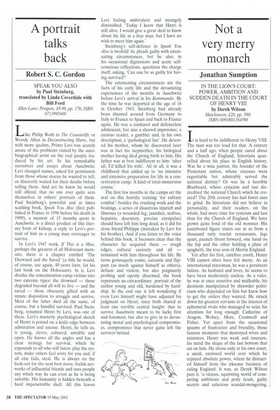A portrait talks back
Robert S. C. Gordon
SPEAK YOU ALSO by Paul Steinberg, translated by Linda Coverdale with Bill Ford
Allen Lane' Penguin, £9.99, pp. 176, ISBN 0713995408
Like Philip Roth in The Counterlife or Woody Allen in Deconstructing Hany, but with more qualms, Primo Levi was acutely aware of the problems visited by the autobiographical artist on the real people traduced by his art. In his remarkable narratives and essays about Auschwitz, Levi changed names, asked for permission from those whose stories he wanted to tell, or discreetly waited for their deaths before telling them. And yet he knew he would still offend, that no one ever quite sees themselves in others' portraits of them. Paul Steinberg's powerful and at times scathing book, Speak You Also (first published in France in 1996 before his death in 1999), a memoir of 15 months spent in Auschwitz, is a direct product of this literary form of kidnap, a reply to Levi's portrait of him as a young man overeager to survive.
In Levi's 1947 work, If This is a Man, perhaps the greatest of all Holocaust memoirs, there is a chapter entitled 'The Drowned and the Saved' (a title he would, of course, use again, 40 years later, for his last book on the Holocaust). In it, Levi divides the concentration-camp victims into two extreme types: the drowned — those degraded beyond all will to live — and the saved — those obscurely gifted with an innate disposition to struggle and survive. Most of the latter died all the same, of course, but a handful survived. Paul Steinberg, renamed Henri by Levi, was one of these, Levi's masterly psychological sketch of Henri is poised on a knife edge between admiration and unease. Henri, he tells us, is young, clever, cultured, amiable and open. He knows all the angles and has a clear strategy for survival, which he expounds to all who will listen: play the system, make others feel sorry for you and, if all else fails, steal. He is always on the look-out for the next best move, builds networks of influential friends and uses people any which way he can even as he is being amiable. His humanity is hidden beneath a hard impenetrable shell. All this leaves Levi feeling ambivalent and strangely diminished. 'Today I know that Henri is still alive. I would give a great deal to know about his life as a free man, but I have no wish to meet him again.'
Steinberg's self-defence in Speak You Also is twofold: he pleads guilty with extenuating circumstances, but he also, in his occasional digressions and acute selfconscious reflections, questions the charge itself, asking, 'Can one be so guilty for having survived?'
The extenuating circumstances are the facts of his early life and the devastating experiences of the months in Auschwitz before Levi's arrival in his Kornmando. By the time he was deported at the age of 16 in October 1943, Steinberg had already been shunted around from Germany to Italy to France to Spain and back to France again. He was a confused and defenceless adolescent, but also a shrewd improviser, a curious reader, a gambler and, in his own description, a 'pathological liar'. He detested his mother, whom he discovered later was in fact his stepmother, his biological mother having died giving birth to him. His father was at best indifferent to him: 'after all, I'd killed his wife'. All in all, it was a childhood that added up to 'an intensive and extensive preparation for life in a concentration camp. A kind of total-immersion course.'
The first few months in the camps set the seal on this horrific training 'for solitary combat': besides the crushing work and the beatings, a series of disastrous injuries and illnesses (a wounded leg, jaundice, scabies, hepatitis, dysentery, porcine erysipelas) should have left him long dead, as it did his close friend Philippe (mistaken by Levi for his brother). And if you listen to the voice behind this book, it becomes clear that the character he acquired there — rough edges, cultural curiosity and all — remained with him throughout his life. By turns grotesquely comic, sarcastic and flippant (as much against himself as others), defiant and violent, but also poignantly probing and openly disarmed, the book represents an extraordinary portrait of the author young and old, hardened by hardship. In the end one is left wondering if even Levi himself might have adjusted his judgment on Henri, since both shared at least one terrible central insight: that to survive Auschwitz meant to be lucky first and foremost, but also to give in to devastating moral and psychological compromises, compromises that never quite left the survivor behind.


































































 Previous page
Previous page